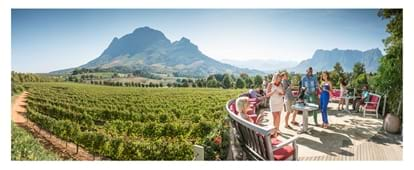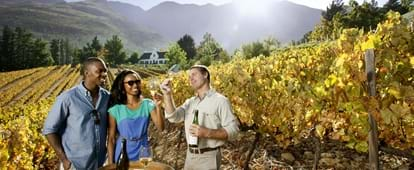By creating an account, I agree to the
Terms of service and Privacy policy
Choose your country and language:
Africa
Americas
Asia Pacific
Europe
SSouth African wines are simply an infusion of the old winemaking methods combined with new ones to create modern bottled poetry for you. On your travels, if you decide to bring South African wine to your palate, home or establishment, and you want to learn more, here are some pointers…
In the 17th century the Dutch embarked on their spice route journey that landed them in the Cape in 1652. Championed by Jan van Riebeeck, they established a settlement to support their voyages. He planted vines in a false bid to ward off the sailors’ scurvy, and thus South African wine was born. Governor Simon van der Stel even purchased a larger allotment in Constantia than what was allowed just so he could plant more vines.
Thankfully, old methods seem to have stuck since Van Der Stel gave land to the French Huguenots near Stellenbosch and Franschhoek. Many producers still use oak barrels to make exquisite styles of wines, with balanced oak and varietal flavour. This creates some ready-to-drink styles, and supposedly gives certain wines some acceptable ageing potential.

SSparkling wine is made using the traditional Méthode Champenoise for the most elegant styles, typically labelled Méthode Cap Classique (MCC). Some of these show real elegance of French finesse by comparison.
The need to create wines of exceptional quality has led to meticulous vineyard management practices and innovative winemaking. Talented winemakers have spread their wings to showcase their unique skills and therefore the market is full of great wines at various price points, which is good news for locals and international tourists.
In Winemag earlier this year, Mike Ratcliffe of Warwick Estate noted the rise and drive of the “small guys” or “mavericks” in the wine industry who are making iconic wines so as not to be left lagging behind. The Sadie Family' T Voetpad 2015 and Rust En Vrede Syrah 2014 made the Wine Spectator’s 2017 Top 100 list and it’s unlikely that this will be the last time local wines are awarded internationally.

IIn recent years the drought has forced producers to make inroads into dry farming, irrigation and old vine preservation. Pulling focus towards old vines, Rosa Kruger of Old Vine Project believes older vines in South Africa bring intensity and freshness to wines. This movement wants to preserve vines older than 35 years by creating an awareness of the heritage of old vines.
If you want to explore the winelands and discover more wines, a good starting point is Platter’s Wine Guide, which not only lists ratings and descriptions for thousands of wines, but farms too. Good-to-visit farms include Steenberg Vineyards, Mullineux and Leeu, Beau Constantia, Vergelegen, Glen Carlou, Delaire Graff, Babylonstoren, DeGrendel, Rupert & Rothschild Vignerons, Morgenster, Creation Wines, Spier, and Cape Point Vineyards.
To sample or buy wines, you can visit wine shops and wine bars around Cape Town such as the Publik Wine Bar, Wine Concepts, Open Wine, Proof Bar and Caroline's Fine Wine Cellar. Here, you’ll make stellar discoveries of scarce and unique wines.

AAbout the author
Stanley Zimbizi is Zimbabwean with, a newly found passion in wine. Stanley lives in Cape Town where he has been socialised into experiential wine tourism. After having completed a Human Resources Degree in 2009 at Midlands State University in Zimbabwe, Stanley moved to Cape Town where he has worked in the hospitality industry for the past five years. He is a current holder of the Wines and Spirits Education Trust (WSET) Level 3 in Wines qualification. He enjoys travelling through the wine glass while having a fat chat about the wine. If not the above, a little bit of music can soothe this man’s soul.
Related articles
South Africa on social media

